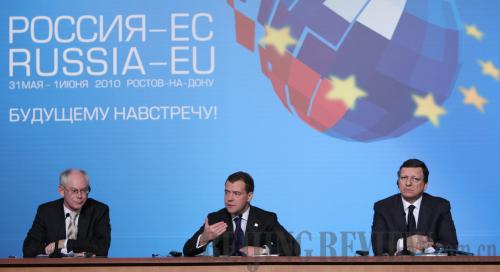|
 |
|
EMBRACING EUROPE: Russian President Dmitry Medvedev attends a press conference following the Russia-EU Summit in Rostov-on-Don, Russia, on June 1, along with European Council President Herman van Rompuy (left) and European Commission President Jose Manuel Barroso (LU JINBO) |

In 2010, despite the generally stable international environment, significant changes occurred seen in international relations. This is due largely to the impact of the global financial crisis and the rise of emerging economies. The United States, Russia and the EU have all made major adjustments in foreign policy, and the post-crisis international political pattern is beginning to feature a relatively balanced power structure, coupled with diversified security mechanisms.
U.S. influence in Asia-Pacific
The Asia-Pacific region is enjoying enhanced status in the global arena, thanks to its surging economic strength and the rise of emerging economies in the region. The Obama administration has correspondingly adjusted its global strategy, making the region a priority. In addition to increasing strategic input, the United States has also become more involved in regional affairs, by diplomatic, military and economic means.
In Northeast Asia, the United States strengthened alliances with Japan and South Korea. A large number of top U.S. officials, including President Barack Obama, have visited Japan to repair relations, which were at a low due to the dispute over the relocation of the U.S. Marines' Futenma airbase in Okinawa. The U.S. officials declared they would unswervingly defend Japan.
Japanese Prime Minister Naoto Kan adopted a realistic diplomatic policy, which placed Japan-U.S. relations at the core. He also clearly expressed his support for the United States' involvement in Asian affairs.
In tandem, recent tensions between North Korea and South Korea have dramatically enhanced U.S.-South Korea relations. Top diplomats and defense officials from South Korea and the United States held unprecedented "two plus two" security talks in Seoul on July 21 to reaffirm their military alliance.
The United States also seized the opportunity to increase the frequency and scale of its joint military exercises with South Korea. It further advocated the establishment of a triangular alliance between the United States, Japan and South Korea to deal with "threats" from North Korea.
In Southeast Asia, the United States drew the Association of Southeast Asian Nations (ASEAN) closer through intensified cooperation. During the UN General Assembly this year, the United States held a second summit with ASEAN leaders. In a declaration issued after the summit, they emphasized the significance of "maritime safety" and "freedom of navigation."
In the meantime, the United States accelerated efforts to form new alliances with Indonesia, Viet Nam and other countries in the region. It also joined the East Asia Summit and stressed it would play a leading role in Asia.
Further, the United States participated in negotiations for the Trans-Pacific Partnership (TPP) and forcefully promoted the expansion of the TPP to East Asia. It planned to use the TPP as a platform to dominate the economic integration of the Asia-Pacific region.
In South Asia, the United States sought to end the counterterrorism war in Afghanistan as quickly as possible. It took both military and political measures against the Taliban, while encouraging the Hamid Karzai-led Afghan Government to hold peace talks with the organization.
Meanwhile, the United States strengthened its counterterror cooperation with Pakistan and enhanced relations with India. During Obama's visit to India in November, he defined U.S.-India relations as a "strategic partnership" in the 21st century. And he declared support for India's attempt to become a permanent member of the UN Security Council. Simply put, the United States regards India as an important partner in its global strategic plan.
Russia's strategic shift
After reviewing its development strategy of the past two decades, Russia has realized the drawbacks of its resource-dependent development model. It is now attempting to foster an innovation-based economy and achieve modernization.
Russia has made this new modernization strategy the standard by which it judges its foreign policy. As a result, Russian foreign policy has experienced significant shifts. Russia is now committed to improving relations, on all fronts, with the West, while enhancing the status of the Asia-Pacific region in its diplomatic strategy.
Russia has certainly strengthened ties with the United States, partly by changing its stance on the Iranian nuclear issue. The two have made breakthroughs in nuclear disarmament negotiations, and signed a new treaty on the reduction of strategic offensive weapons. What's more, this year Russia completed negotiations with the United States on its accession to the WTO, which lasted 17 years.
Russia's relations with Europe have also been enhanced. At the Russia-EU Summit in June, Russian President Dmitry Medvedev proposed a "partnership for modernization" initiative, which focused on strengthening economic cooperation between the two sides. Russia agreed to cooperate with NATO on the development of a European missile defense system. It also strengthened cooperation with NATO in Afghanistan.
While improving relations with the West, Russia, for the first time, placed the Asia-Pacific region, home to many emerging economies, before the Commonwealth of Independent States in its diplomatic strategy. It took a series of measures to increase its presence in the region.
For instance, it further consolidated its strategic partnership with China. Together the United States, it became a member of the East Asia Summit. And it strengthened relations with its traditional partners in the region—India and Viet Nam. It held a large joint military exercise with India and signed the first nuclear agreement with Viet Nam, worth more than 4 billion euros ($5.2 billion).
Europe's repositioning
While slowly recovering from the financial crisis, the euro zone is trapped in a sovereign debt crisis. It is facing the most severe test since its establishment.
| 